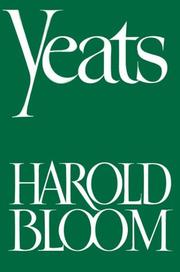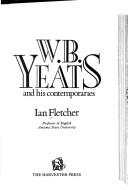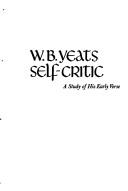| Listing 1 - 10 of 70 | << page >> |
Sort by
|

ISBN: 0195016033 Year: 1972 Publisher: London
Abstract | Keywords | Export | Availability | Bookmark
 Loading...
Loading...Choose an application
- Reference Manager
- EndNote
- RefWorks (Direct export to RefWorks)

ISBN: 0710806132 Year: 1987 Publisher: Brighton Harvester Press
Abstract | Keywords | Export | Availability | Bookmark
 Loading...
Loading...Choose an application
- Reference Manager
- EndNote
- RefWorks (Direct export to RefWorks)
Multi
ISBN: 9781839986574 9781839986550 Year: 2023 Publisher: London Anthem Press
Abstract | Keywords | Export | Availability | Bookmark
 Loading...
Loading...Choose an application
- Reference Manager
- EndNote
- RefWorks (Direct export to RefWorks)
Periodical
ISSN: 02787687 20543611 Year: 1982 Publisher: Basingstoke MacMillan
Abstract | Keywords | Export | Availability | Bookmark
 Loading...
Loading...Choose an application
- Reference Manager
- EndNote
- RefWorks (Direct export to RefWorks)
Yeats, William B. --- Arts and Humanities --- Literature --- Yeats, William Butler
Book
ISBN: 0195049543 Year: 1988 Publisher: New York Oxford University Press
Abstract | Keywords | Export | Availability | Bookmark
 Loading...
Loading...Choose an application
- Reference Manager
- EndNote
- RefWorks (Direct export to RefWorks)
Comparative literature --- Pound, Ezra --- Yeats, William B. --- Yeats, William Butler
Book
ISBN: 0713150599 0713150580 9780713150599 Year: 1976 Volume: 4 Publisher: London: Edward Arnold,
Abstract | Keywords | Export | Availability | Bookmark
 Loading...
Loading...Choose an application
- Reference Manager
- EndNote
- RefWorks (Direct export to RefWorks)
Yeats, William Butler, --- Yeats, W. B. --- Criticism and interpretation. --- Poetry --- Yeats, William B. --- Criticism and interpretation --- Yeats, W. B. (William Butler), --- Yeats, William Butler --- Yeats, W. B. - (William Butler), - 1865-1939 - Criticism and interpretation --- Yeats, W. B. - (William Butler), - 1865-1939 --- William Butler Yeats (1865 - 1939)

ISBN: 0520019334 0520019342 Year: 1971 Publisher: Berkeley : University of California Press,
Abstract | Keywords | Export | Availability | Bookmark
 Loading...
Loading...Choose an application
- Reference Manager
- EndNote
- RefWorks (Direct export to RefWorks)
Yeats, William B. --- Poetry --- Self in literature. --- Poetics --- Psychological aspects. --- History --- Yeats, W. B. --- Criticism and interpretation. --- Ireland --- In literature. --- Yeats, W. B., --- Yeats, W. B, --- Yeats, William Butler
Book
ISBN: 0300046278 0300017731 9780300017731 9780300046274 Year: 1989 Publisher: New Haven: Yale university press,
Abstract | Keywords | Export | Availability | Bookmark
 Loading...
Loading...Choose an application
- Reference Manager
- EndNote
- RefWorks (Direct export to RefWorks)
Yeats, William B. --- Dramatic works. --- Abbey Theatre. --- Yeats, W. B., --- English literature --- Drama --- Theater --- History --- Knowledge --- Performing arts. --- Yeats, William Butler
Book
ISBN: 2715221061 Year: 1998 Publisher: Paris Mercure de France
Abstract | Keywords | Export | Availability | Bookmark
 Loading...
Loading...Choose an application
- Reference Manager
- EndNote
- RefWorks (Direct export to RefWorks)
Shakespeare, William, --- Yeats, W. B. --- Criticism and interpretation.
Book
ISBN: 9781009411691 1009411691 1009411713 1009411705 9781009411677 9781009411721 1009411675 Year: 2024 Publisher: Cambridge, England : Cambridge University Press & Assessment,
Abstract | Keywords | Export | Availability | Bookmark
 Loading...
Loading...Choose an application
- Reference Manager
- EndNote
- RefWorks (Direct export to RefWorks)
Yeats, Revival, and the Temporalities of Irish Modernism offers a new understanding of a writer whose revivalist commitments are often regarded in terms of nostalgic yearning and dreamy romanticism. It counters such conventions by arguing that Yeats's revivalism is an inextricable part of his modernism. Gregory Castle provides a new reading of Yeats that is informed by the latest research on the Irish Revival and guided by the phenomenological idea of worldmaking, a way of looking at literature as an aesthetic space with its own temporal and spatial norms, its own atmosphere generated by language, narrative, and literary form. The dialectical relation between the various worlds created in the work of art generate new ways of accounting for time beyond the limits of historical thinking. It is just this worldmaking power that links Yeats's revivalism to his modernism and constructs new grounds for recognizing his life and work.
| Listing 1 - 10 of 70 | << page >> |
Sort by
|

 Search
Search Feedback
Feedback About UniCat
About UniCat  Help
Help News
News